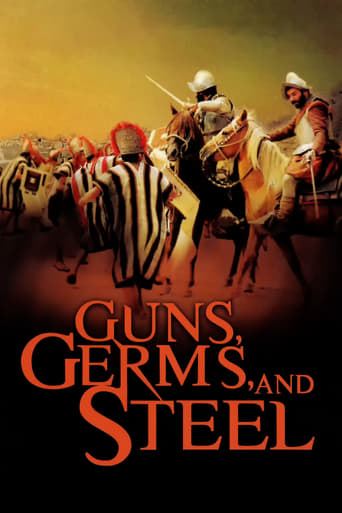David Shon
The Documentary, Guns Germs and Steel is an informational and argumentative documentary about Jared Diamond's theory on why there is a big difference between those who have advanced technology and those who live normally focusing more on gathering food instead of improving technology. I personally recommend this documentary to both Adults and Teenagers as it became one of my favourite documentaries because of the information it provides, and the reasons why and how the Europeans settled in South Africa.I have read the other reviews on the site and I agree with some of them. This information could have been presented in less than 2 hours, but there were some useless scenes like the time when Jared failed to shoot the arrow from the bow. I recommend Jared Diamond try to not overcome his sad feelings because he looked kind of strange when he was weeping and crying. Other than that, this documentary gives full explanatory reasons of the topic and is easy to understand.
Nooshin Navidi
As much as I enjoyed this film, my enthusiasm was dampened by the fact that most of Diamond's revelations are ideas that were in circulation as far back as a hundred years ago.I couldn't help but wonder why someone so well-versed in history & anthropology would be triumphant about the "discovery" that Europeans used smallpox to wipe out Native Americans, that guns helped Europeans conquer Africa, or that malaria made it impossible for Europeans to migrate into the center of Africa in large numbers.Furthermore, his explanation ignores the social, economic & political dimensions of world conquest by Europeans, not to mention the ethical & religious implications of past and present conquests and inequalities, chalking it all up to the impersonal forces of luck and "geography".His reaction to witnessing the horrors of disease-ridden African children is startlingly naive, leaving one with the question: Why did Europeans set out to conquer Africa, killing hundreds of millions of people in order to spread out & enrich its economies, rather than do the same thing to China?? The Chinese invented gunpowder and had cannons before Europeans even heard of guns. Furthermore, they had a far greater population, a more advanced technology, & more efficient agriculture.The answer lies in certain structures within European society. Until we figure out what this is and how it still manifests itself in our world, we will never be able to understand why inequality still exists in our world. Nevertheless, Jarred Diamond's optimistic conclusion is sincere. One can see how much he wants a better world.~NN
gray4
I came to this with great expectations as a long-time admirer of Jared Diamond and his books, including 'Guns, Germs and Steel'. It was shown on UK TV as a 2+ hour documentary but it was painfully obvious that it originated as a 30-minute series. The result was that every half-hour or so the continuity was punctured by long and tedious repetitions of what had gone before - a real spoiler! The main themes of the book came across clearly and it was good to see Jared Diamond's personal first-hand responses to world events that he had previously only studied from a distance as an academic. But overall the programme was unbalanced, with far too much time devoted to Pizarro and the conquest of Peru (in the book only 15 pages out of 450) and nothing at all to his chapters on China and Polynesia.Yes, I know that I was expecting too much and it was great to see such important ideas about "a short history of everybody for the last 300 years" (his subtitle) popularised via television. But by the end I felt that it could have been so much better.
Arel
This series adds new information and background to the book and includes personal appearances by the author and by archaeologists and other anthropologists. It brings the book to life and makes even more sense of the author's subsequent opus, *Collapse*.Diamond himself comes off as personable and caring, not just a disinterested or disengaged academic. This series makes it clear that his book was not just a response to a need to "publish or perish," as the saying goes about academe, but a deeply considered answer to a question from someone he respects, "Why you white people got so much cargo, and we have so little?" Because he respected the intelligence of the questioner and his community, Diamond looked for an answer that didn't insult that intelligence or that community. I like to think of his answer in a very simple way, in the same spirit as "South Park's" "Blame Canada": "Blame wheat!"
